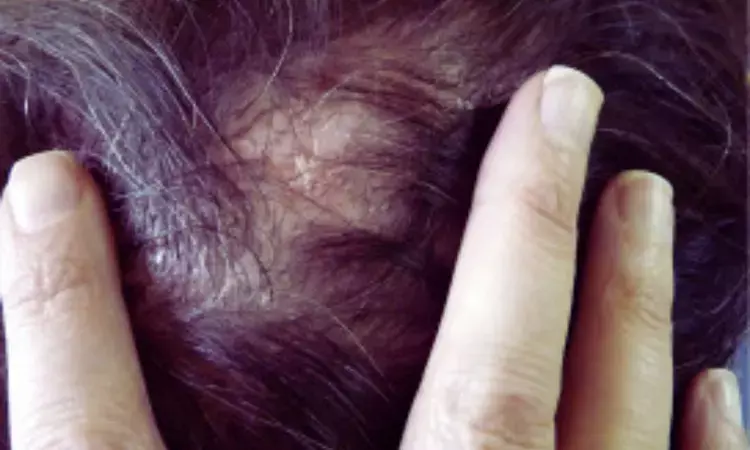- Home
- Medical news & Guidelines
- Anesthesiology
- Cardiology and CTVS
- Critical Care
- Dentistry
- Dermatology
- Diabetes and Endocrinology
- ENT
- Gastroenterology
- Medicine
- Nephrology
- Neurology
- Obstretics-Gynaecology
- Oncology
- Ophthalmology
- Orthopaedics
- Pediatrics-Neonatology
- Psychiatry
- Pulmonology
- Radiology
- Surgery
- Urology
- Laboratory Medicine
- Diet
- Nursing
- Paramedical
- Physiotherapy
- Health news
- Fact Check
- Bone Health Fact Check
- Brain Health Fact Check
- Cancer Related Fact Check
- Child Care Fact Check
- Dental and oral health fact check
- Diabetes and metabolic health fact check
- Diet and Nutrition Fact Check
- Eye and ENT Care Fact Check
- Fitness fact check
- Gut health fact check
- Heart health fact check
- Kidney health fact check
- Medical education fact check
- Men's health fact check
- Respiratory fact check
- Skin and hair care fact check
- Vaccine and Immunization fact check
- Women's health fact check
- AYUSH
- State News
- Andaman and Nicobar Islands
- Andhra Pradesh
- Arunachal Pradesh
- Assam
- Bihar
- Chandigarh
- Chattisgarh
- Dadra and Nagar Haveli
- Daman and Diu
- Delhi
- Goa
- Gujarat
- Haryana
- Himachal Pradesh
- Jammu & Kashmir
- Jharkhand
- Karnataka
- Kerala
- Ladakh
- Lakshadweep
- Madhya Pradesh
- Maharashtra
- Manipur
- Meghalaya
- Mizoram
- Nagaland
- Odisha
- Puducherry
- Punjab
- Rajasthan
- Sikkim
- Tamil Nadu
- Telangana
- Tripura
- Uttar Pradesh
- Uttrakhand
- West Bengal
- Medical Education
- Industry
Less Can Be More: Study Finds Low-Dose Doxycycline Works Well for Scarring Alopecia, With Fewer AEs

USA: A recent study published in the Journal of the American Academy of Dermatology has highlighted the potential of low-dose doxycycline as an effective and better-tolerated treatment option for patients suffering from lymphocytic scarring alopecias. This group of conditions, which includes disorders like lichen planopilaris and frontal fibrosing alopecia, is characterized by irreversible hair loss due to inflammation and scarring of hair follicles.
"Low-dose doxycycline demonstrated similar effectiveness to high-dose therapy in managing lymphocytic scarring alopecia while being associated with fewer adverse events and a lower rate of treatment discontinuation," the researchers wrote.
To evaluate treatment outcomes with low-dose doxycycline in lymphocytic scarring alopecia, Carli Needle BA, The Ronald O. Perelman Department of Dermatology, NYU Grossman School of Medicine, New York, NY, and colleagues conducted a retrospective review of 241 patients diagnosed between 2009 and 2023. The cohort had a mean age of 58.4 years and was predominantly female (82.6%), with 49.8% identifying as White and 14.1% as Black. The most frequently diagnosed conditions included lichen planopilaris (50.2%), frontal fibrosing alopecia (45.6%), and central centrifugal cicatricial alopecia (15.4%). Of the total, 64 patients (27.4%) received low-dose doxycycline (20 mg twice daily, 40 mg daily, or 50 mg daily), while 175 (72.6%) were treated with high-dose regimens (50 mg twice daily, 100 mg daily, or 100 mg twice daily).
All patients also received adjunctive therapies, most commonly intralesional corticosteroids (56.4%), topical corticosteroids (46.1%), and 5% topical minoxidil (31.5%). Treatment outcomes were assessed based on inflammation severity, scalp symptoms, hair loss stability, and patients’ perceptions of their condition.
Based on the study, the researchers reported the following findings:
- No significant differences were observed between low- and high-dose doxycycline groups in terms of improvement in inflammation severity, hair loss stability, or the number of scalp symptoms.
- There were similar results in the subgroup of patients with lichen planopilaris and frontal fibrosing alopecia, with no significant differences across inflammation, hair loss stability, or symptom count.
- After adjusting for adjunctive treatments, patient-reported outcomes did not significantly differ between dose groups.
- High-dose doxycycline was associated with a higher rate of adverse events (23.4%) compared to low-dose treatment (12.1%).
- The most common adverse events were gastrointestinal symptoms (11.4% in high-dose vs 6.0% in low-dose) and photosensitivity or rash (6.9% vs 4.6%).
- Doxycycline dosage had to be reduced or discontinued due to adverse events in 20.4% of high-dose patients versus 9.1% of low-dose patients.
The authors concluded that low-dose doxycycline offers comparable efficacy to high-dose regimens in managing lymphocytic scarring alopecias while demonstrating improved tolerability and fewer adverse events. They emphasized the potential of low-dose therapy as a safer treatment option and highlighted the need for prospective studies to further validate its effectiveness and long-term benefits in this patient population.
Reference:
Needle, C., Brinks, A., Pulavarty, A., Kearney, C., Nohria, A., Desai, D., Shapiro, J., & Lo Sicco, K. (2025). Efficacy and Tolerability of Low-Dose Versus High-Dose Doxycycline in the Management of Lymphocytic Scarring Alopecias. Journal of the American Academy of Dermatology. https://doi.org/10.1016/j.jaad.2025.02.028
Dr Kamal Kant Kohli-MBBS, DTCD- a chest specialist with more than 30 years of practice and a flair for writing clinical articles, Dr Kamal Kant Kohli joined Medical Dialogues as a Chief Editor of Medical News. Besides writing articles, as an editor, he proofreads and verifies all the medical content published on Medical Dialogues including those coming from journals, studies,medical conferences,guidelines etc. Email: drkohli@medicaldialogues.in. Contact no. 011-43720751


